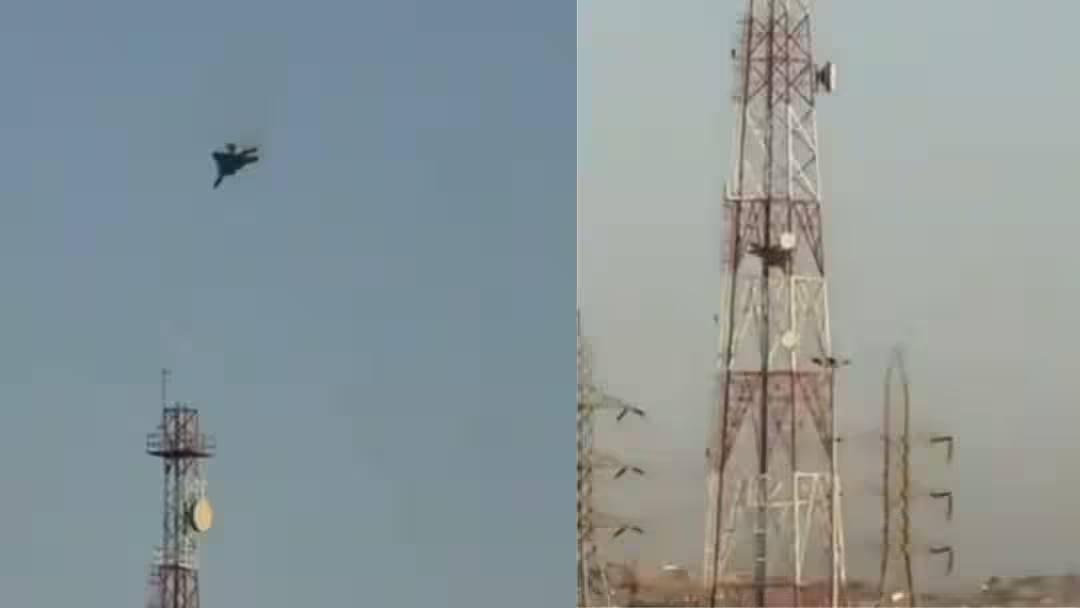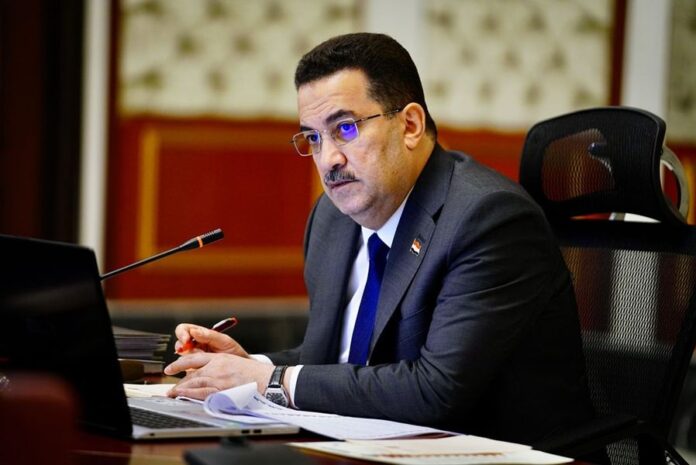
The Prime Minister of the Republic of Iraq, Mr Mohammed S Al-Sudani, chaired today the 21st Regular Session of the Council of Ministers. During the session, the Council of Ministers discussed the country’s general situation, the most prominent issues, and the items on the agenda and issued several decisions.
During the beginning of the meeting, the Prime Minister Mohammed S Al Sudani highlighted Iraq’s active role in the 32nd Arab Summit, held in Jeddah, Saudi Arabia. The Iraqi delegation strongly emphasized the significance of promoting collaborative Arab initiatives, fostering integration, and forging economic partnerships among brotherly and friendly nations in the region.
In addition, they underscored that cooperation in these areas plays a crucial role in enhancing stability and facilitating development, ultimately benefiting all the peoples of the region.
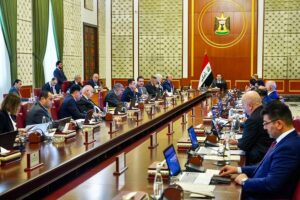
To expedite the implementation of the new Sadr City project, the Prime Minister Mohammed S Al Sudani issued directives to facilitate the necessary procedures. Firstly, the expropriation of land number (1 District 11) and spanning an area of (152 dunums and 18 acres) will be transferred from the Ministry of Finance to the Municipality of Baghdad.
Additionally, the plot of land with the number (72/2 District 11) and covering an area of (294 dunums and 18 acres) will be transferred from the Ashur General Company, operating under the Ministry of Construction, Housing, Municipalities, and Public Works, to the Municipality of Baghdad.
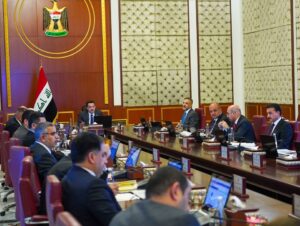
It was also reported that these actions aim to streamline the procedures required for implementing the project and ensure effective coordination between relevant authorities. “Regarding economic and developmental matters, the Cabinet has endorsed the recommendation put forth by the Ministerial Council for Economy (23083),” said the Prime Minister Mohammed S Al Sudani.
This recommendation encompasses the approval of the committee’s suggestions, which consist of the General Secretariat of the Council of Ministers’ letter containing the following key points:
- The Iraqi General Authority for Railways has been tasked with finalizing the proposed route for the railway project, which will extend from the coastal areas to the southern region of the port of Khor Al-Zubayr.
This route should be planned outside the boundaries of lands owned by the General Directorate of Free Zones. To ensure effective coordination, the Iraqi General Authority for Railways will work in collaboration with the Ministry of Oil and Ministry of Water Resources, as well as the General Directorate of Free Zones.
The completion of this coordination process should be accomplished within a maximum timeframe of two working weeks.
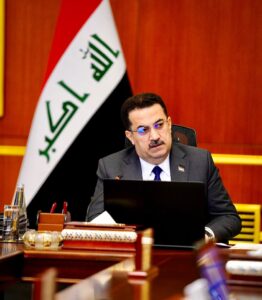
2. The Ministry of Finance will open a customs office at the end of the proposed railway track in accordance with the Customs Law (23 of 1984).
3. The Ministry of Transportation, in adherence to the Ministry of Transportation Law (Law 7 of 1994), collaborates with the Real Estate Registration and State Real Estate departments to accurately determine the land area needed for the project.
Furthermore, this collaborative effort aims to ensure precise calculations and compliance with legal requirements. The Ministry of Transportation will initiate the process of purchasing it from the Ministry of Finance, following the appropriate legal procedures.
4. The Ministry of Transportation will acquire the resources needed for the project, pending the submission of a feasibility study to the relevant authority. The study will comply with Article (1/ Eighth) of the Ministry of Transportation Law and assess the project’s viability before implementation.
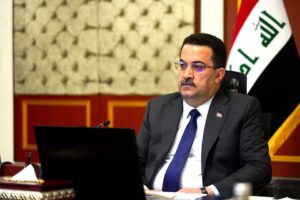
In the matter of the railway connection with the Islamic Republic of Iran, the Council of Ministers has approved the following measures:
1. All relevant authorities are required to facilitate the transfer of land ownership for the Basra-Shalamja railway project to the Ministry of Transportation, ensuring the necessary facilities are provided.
2. The Ministry of Transportation, specifically the General Company for Iraqi Railways, is authorized to hand over designated land sites, including minefields and the location of the navigational bridge on the Shatt al-Arab, to the Iranian railways. This will initiate the process of mine clearance.
3. “The Basra Governorate has been assigned to commence actions aimed at removing any obstacles along the railway track of the project. This includes addressing any transgressions or conflicts that impede the smooth progress of the project,” said the sources.
To address the housing crisis and create new cities with proper infrastructure and land ownership, the Cabinet approved an amendment to Cabinet Resolution (324 of 2022).
It designates 3000 dunums of the Ghazlani camp for the Ministry of Defence, with the condition that it will not be used as military headquarters or barracks.
Moreover, the ownership of the land will be transferred to investing and beneficiary entities in the future. This amendment aims to support the government’s housing program and promote the development of new cities.
To regulate traffic in the capital and major cities, as well as reduce congestion and traffic accidents caused by the unregulated use of motorcycles and similar vehicles, the Cabinet has approved the recommendations put forth during a workshop held by the Ministry of Interior.
The workshop aimed to address the issue of the widespread use of motorcycles, motorcycle taxis, commonly known as “tuk-tuk,” and three-wheeled cargo motorcycles. The approved recommendations include the following measures:
1. The importation of tuk-tuk motorcycles that do not meet the required safety, security conditions, and standard specifications is strictly prohibited.
2. The importation of small bikes with an engine size of less than 40 cc is strictly prohibited for any purpose.
3. The importation of motorcycles, regardless of their form, with an engine size of 40 ccs or greater, will be halted, except for the specific needs of the security and traffic departments.
4. Stop granting licenses for motorcycle production lines and local assembly workshops in Iraq, and review existing licenses in accordance with the law.
5. All motorcycles must be registered and have registration plates affixed within a period of three months. This registration is essential for creating a comprehensive database to enhance security measures.
It was said that the failure to register within the given timeframe would result in the impoundment of the motorcycle and its subsequent confiscation by the General Customs Authority.
To expedite the process, the General Authority for Customs, in coordination with the Traffic Directorate, will issue registration books and customs permits for motorcycles, facilitating a swift completion of the registration procedure.
6. The Movement of motorcycles, including scooters, tuk-tuk, and small motorcycles under 40 ccs, will be regulated based on the following guidelines:
a. Movement of motorcycles on highways and main roads is prohibited.
b. Registered motorcycles can operate in agricultural areas, closed tourist areas, alleys, narrow and side roads, and residential areas.
7. Five motorcycles with two or three wheels or more (tuk-tuk) will be deregistered, subject to their suitability for work. In exchange, the owners of these motorcycles will be able to register a newly imported vehicle and receive soft loans.
8. The implementation of Paragraph (3) of this decision will commence on July 1, 2023.
In preparation for the upcoming Hajj season to the Sacred House of Allah, the Cabinet has approved the adoption of national carriers, such as Iraqi Airways, other local carriers, or Saudi Arabian carriers, to transport pilgrims in the current year. This decision serves as an exception to Cabinet Resolution (43 of 2015).
Additionally, as part of the government’s efforts to implement administrative reform and combat corruption, the Council of Ministers has approved an amendment to Regulation No. (3) of 1999 for the Auditing and Accounting Profession.
“This amendment allows government agencies to enter into contracts with reliable international financial auditing firms, in coordination with the Federal Board of Supreme Audit and with the approval of the Prime Minister,” reports added.
This amendment eliminates the requirement for a license to practice the auditing profession and is effective from the date of its issuance.
To enhance the conditions for social service providers, the Cabinet has decided to grant a 50% allowance of the salary to employees in residential care homes across Baghdad and all governorates.
The decision, effective from June 1, 2023, is based on Article 15 of the State Salaries Law for public sector employees (Law No. 22 of 2008, as amended). It aims to appreciate their humanitarian service and motivate employees who will be transferred to residential care homes.
The Cabinet has also approved a bill ratifying an agreement between the Government of Iraq and the Government of the Russian Federation. This agreement exempts holders of diplomatic, service, and regular passports from entry visas.
The agreement was signed in Baghdad on April 2, 2023, and will be forwarded to the Council of Representatives for further action.
The Cabinet of Ministers has approved a bill amending Iraq’s accession to the International Convention on Load Lines. The bill, prepared by the State Council, has been referred to the Council of Representatives for consideration.
“Iraq’s adherence to this agreement does not signify recognition of Israel or the establishment of any relationship with it, in accordance with the Treaties Law (No. 35 of 2015),” stressed the ministers.
The Cabinet also discussed several public affairs topics listed on the agenda and made the following decisions:
First: The Cabinet has approved the transfer of the plane (MI-172) (VIP) along with its spare parts and accessories from the Iraqi National Intelligence Service to the Ministry of Defence.
This decision is in accordance with the provisions stated in Paragraph (1) of Cabinet Resolution (206 of 2019) and confirmed by Paragraph (1) of Cabinet Resolution (340 of 2021).
Second: In order to bolster the operations of the Military Industrialization Commission and ensure the prudent use of public funds, the Cabinet has made the following decisions:
1. Ministries and security agencies must donate coloured metals, weapons, military equipment, and spent and out-of-service metals to the Military Industrialization Commission at no cost. However, the companies under the Ministry of Industry and Minerals are exempted from this requirement concerning copper.
2. The transportation of coloured metal waste will be closely monitored by the Iraqi National Security Agency, ensuring that it has been cleared of any radiation by the Radiation Protection Centre.
3. Trading arrangements will be established between the Military Industrialization Authority and the respective authorities to determine the terms and details. These arrangements will be based on an agreement between the Military Industrialization Authority and the relevant authorities.
Third: The Cabinet has approved including the Popular Mobilization Commission in the amended Cabinet Resolution (142 of 2009) concerning secret expenses. Additionally, an allocation of one billion and five hundred thousand dinars will be added to the Popular Mobilization Commission for the purpose above.
At the end of the meeting, Prime Minister Mohammad S Al Sudani extended his thankfulness to his fellow ministers and cabinet members for contributing and playing their vital role in the session.
